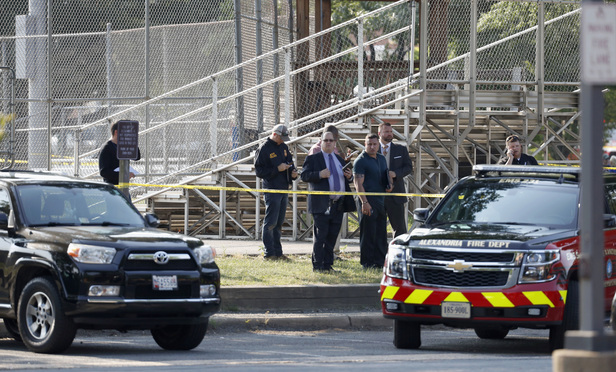 Law enforcement officers investigate the scene of a shooting near a baseball field in Alexandria, Va., Wednesday, June 14, 2017, where House Majority Whip Steve Scalise of La. was shot at a Congressional baseball practice. (AP Photo/Alex Brandon)
Law enforcement officers investigate the scene of a shooting near a baseball field in Alexandria, Va., Wednesday, June 14, 2017, where House Majority Whip Steve Scalise of La. was shot at a Congressional baseball practice. (AP Photo/Alex Brandon)
The Supreme Court’s conference Thursday includes a challenge to concealed-carry restrictions in California. The Orlando nightclub shooting in June 2016 occurred days before the court declined to hear post-Sandy Hook gun laws.
A year after the deadliest mass shooting in U.S. history, at an Orlando nightclub, another major shooting—Wednesday’s gunfire that injured a member of Congress—unfolded as the U.S. Supreme Court prepares to consider the latest challenge to gun regulations.
The justices on Thursday are scheduled to review the case Peruta v. California, a challenge to restrictions in California against carrying concealed firearms in public. The U.S. Court of Appeals for the Ninth Circuit in June 2016 said there is no Second Amendment protection to such carrying of a gun.
Last June, the Orlando massacre at the Pulse club, which killed 49 people and wounded 58, happened just days before the justices took their first look at a challenge to Connecticut’s ban on military-style firearms. The high court subsequently declined to hear the case, leaving in place restrictions adopted after the shooting at Sandy Hook Elementary School killed 20 children and six teachers.
Whether Peruta will share the same fate as the Connecticut case is difficult to predict. The California case has been listed for the justices’ private conference 11 times and rescheduled four times since the petition, brought by Kirkland & Ellis partner Paul Clement, was filed on Jan. 12.
What is clear, however, is that the justices have been reluctant to step back into the Second Amendment debate over gun regulation. They have turned away at least 10 challenges to state and local gun regulations since their two landmark decisions in 2008 in District of Columbia v. Heller and two years later in McDonald v. City of Chicago.
In Heller, a 5-4 court held that the Second Amendment guarantees an individual right to possess a handgun for self-defense in the home. The 5-4 majority in McDonald applied the Second Amendment to the states.
Only three justices have dissented when the high court has turned away new gun regulation challenges: the late Justice Antonin Scalia, and Justices Clarence Thomas and Samuel Alito Jr.
In 2015, when the justices denied review of a challenge to Highland Park, Illinois’ ban on assault weapons, Thomas dissented. He wrote then: “Roughly 5 million Americans own AR-style semiautomatic rifles. The overwhelming majority of citizens who own and use such rifles do so for lawful purposes, including self-defense and target shooting. Under our precedents, that is all that is needed for citizens to have a right under the Second Amendment to keep such weapons.”
California regulates open carry and concealed carry of guns in public. Open carry is generally prohibited, with a few exceptions. Anyone applying for a concealed-carry license must show, among other requirements, that “good cause” exists for the license. The state’s counties may decide what constitutes “good cause.”
In Peruta, Clement argues that the San Diego sheriff’s interpretation of “good cause” is so restrictive that the typical law-abiding resident in the county cannot get a concealed-carry license. “And because California law prohibits openly carrying a handgun outside the home, the result is that the typical law-abiding resident cannot bear a handgun for self-defense outside the home at all.”
The en banc Ninth Circuit narrowly examined “whether the Second Amendment protects, in any degree, the ability to carry concealed firearms in public.” It did not reach the question whether the right to bear arms existed outside of the home.
The justices also have pending a petition filed by the Trump administration’s U.S. Justice Department that seeks to overturn a Third Circuit decision. The case, Sessions v. Binderup, is on the court’s Thursday conference list.
The appeals court last year said the federal ban on felons possessing guns violated the Second Amendment rights of two men convicted of nonviolent misdemeanor offenses. The case has been listed six times for the court’s private conference.
Wednesday’s shooting happened in a Virginia suburb of Washington. U.S. Rep. Steve Scalise, R-Louisiana, and others were shot and injured on a baseball field as they practiced for an annual charity game. The alleged gunman, identified as 66-year-old James Hodgkinson, of Illinois, was wounded and later died from injuries sustained during a gunfight with police.
A lobbyist for Tyson Foods, Matt Mika, director of government relations for the company’s Washington office, was also injured in the shooting, according to Politico, which quoted a statement from the company. Tyson Foods said Mika has worked for the company for more than six years.




